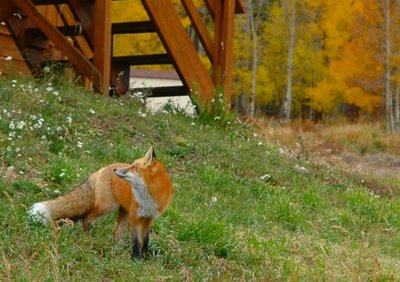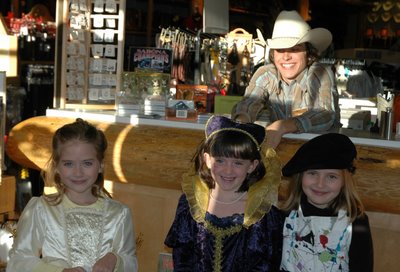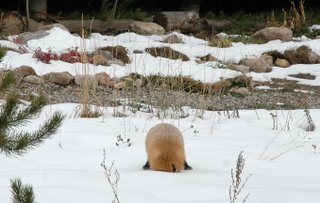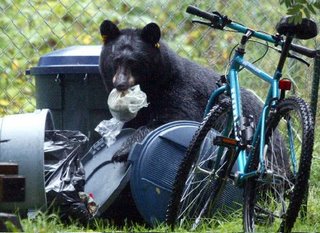 "And the fox said, Do not shoot me for I will give you good counsel...."
"And the fox said, Do not shoot me for I will give you good counsel...."By far, the most sighted wildlife here has been the red fox. At least every other day we see one in the "neighborhood." They trot around like domestic dogs, quite familiar with man. I imagine they are accustomed to scavenging through our trash. They are beautiful creatures. I can see why they were so hunted at one time. I don't know if it's legal to hunt them now, but I did recently see a red fox pelt in an antique store in Frisco that was priced at $110 dollars.
Mostly what we see are black crows big as cats and very menacing-looking. Stellar Jays are common, but the hummingbirds have migrated south I suppose.I hear there are bears that get into the trash (thus the locks on the community bin) but I've yet to see one.
I've been videotaping the fall scenery and putting together a short video to music. That, and working on Carol's genealogy video project. I spend a lot of time alone which can be very helpful to creativity. That's my strong suit, which is good since I don't have any friends here. Actually, I've always preferred to be alone. I think I'm a much more interesting and nicer person when it's just me! Today was quiet but very satisfying. I walked Lily Pad trail and collected a back pack full of pine cones thinking Allie and I could make something with them. It was kind of eerie with the overcast skies and the wind making the pines moan. I became so obsessed with finding the perfect unweathered pine cones that I became a little disoriented and when the sky suddenly grew dark I got a little spooked. I felt like a Little Red Riding Hood oblivious to what lurked beyond. So that's where the stories began. Now I had an intuitive understanding of the origins of old German fairy tales with the witches, goblins, and wolves. I could see how the world of the forest could draw a mind to frightful imaginations: The tall pines creaking, the wind whistling, the burnt tree stubs looking like black bears, the sky darkening, the sun disappearing, the mist suddenly filling the voids. Eeeeeeeooooh.
All the way home I recalled the tales I read from the
Brothers Grimm and wondered how environment truly inspires folklore. My parents weren't German, never read dark bedtime tales to me, but I realize now that the gift of the
Brothers Grimm from my aunt when I was 10 made more of an impression than I realized. I read it front to back and remember it being full of scary stories, not like the usual ghost stories around the campfire, but tales based in deeper, psychological themes like abandonment and abuse. These were stories told and read to children through the ages, but even then, as a kid reading then to myself, I thought they were terrifying. What were those Germans trying to impress on their kids?
Look out for evil, I suppose. In the peace-loving 70's I couldn't imagine what evil lurked riding my bicycle through our suburban neighborhood till dusk called me home for dinner. Still, those fairy tales worked their way into my subconscious.
I've learned since that modern psychologists have theorized that those stories are myths that represent our emotional angst and Freudian hang-ups.

They believe the tales speak to us about our struggles to become fully human. So when I was ten reading about Hansel and Gretel almost becoming a witch's dinner, I believed it was their due for their greed and gullibility. How was I supposed to know it was a study in object relations and maternal cannibalism? I just thought those stories were warnings to children about the dangers of wandering away from home and talking to strangers. That much is easy to understand--especially if you've been in the deep dark forest.

 I remember growing up in the suburbs where we took a pillowcase, joined up with other neighborhood kids and disappeared into the night. Of course, here, they have the snow and cold and terrain to contend with and since less than 4000 people live in Silverthorne and something like 60% of the homes are frequently vacant vacation homes, the outlet stores make a safe setting.
I remember growing up in the suburbs where we took a pillowcase, joined up with other neighborhood kids and disappeared into the night. Of course, here, they have the snow and cold and terrain to contend with and since less than 4000 people live in Silverthorne and something like 60% of the homes are frequently vacant vacation homes, the outlet stores make a safe setting.












